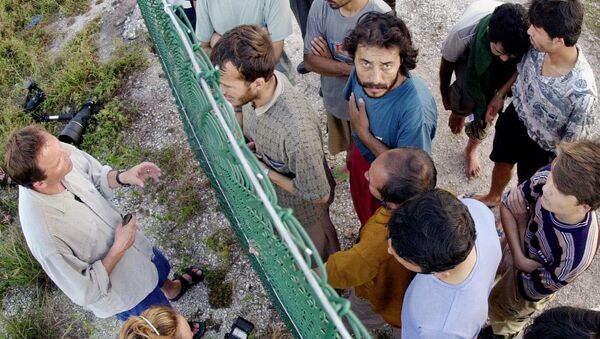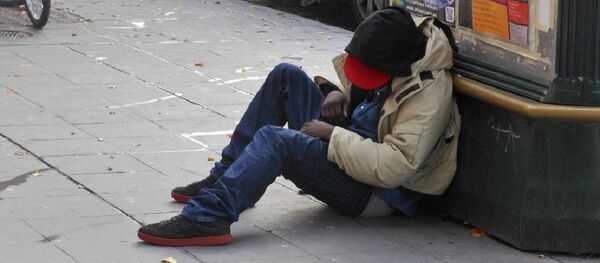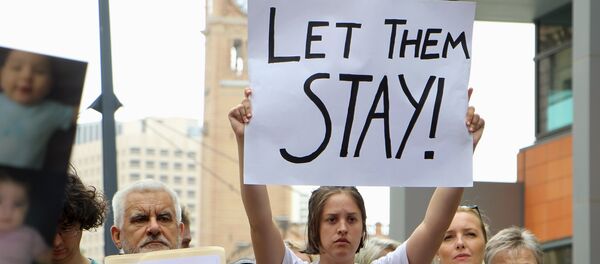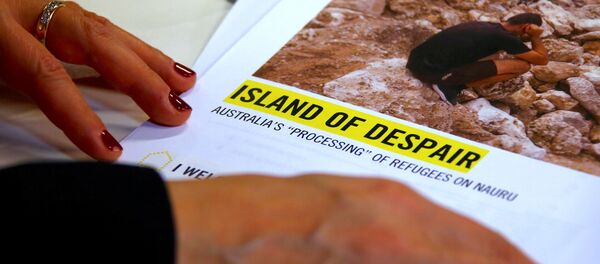Under current Australian law, individuals who attempt to reach the country illegally by boat are either intercepted in the water and turned away or, if they reach the shore, are removed from Australia for processing in the impoverished nations of Papua New Guinea and Nauru, a small Pacific island.
The camps in which migrants wait for processing have been criticized by rights groups as cramped and squalid. This spring a man and a woman in Nauru set themselves on fire in protest, and many other attempts at suicide among asylum seekers have been recorded.
Since 2013, even those who are eventually found to fit the criteria for refugee status are not allowed to come to Australia, but settled in Nauru or Papua New Guinea, who Australia pays to house them. Cambodia was also added to the list of possible resettlement countries; only four have so far taken that option, the BBC reported in August.
The roughly 1,300 eligible migrants in camps in the island camps now are eligible for the program, as are another 370 who came to Australia for medical treatment and have not left, the Associated Press reports. It is not known, however, how many will be resettled through the new plan.
A "substantial number" will be taken for resettlement, the Guardian reports, but it will be up to the US to decide the actual number as the project details are settled over the coming months. Women, children and families are to be given priority, and US Homeland Security officials are expected to being arriving in Australia to start the process this week.
Any refugee who refuses to go to the US would be given a 20-year visa to stay on Nauru, according to Australian Immigration Minister Peter Dutton.
"This opportunity will be only available to those accepted by the United States on Nauru and Manus now," Australian Prime Minister Malcolm Turnbull said in announcing the deal November 13, as reported by CNBC.
"It will not be available to anyone who seeks to come to Australia by people smuggler in the future."
Turnbull would not say whether he had discussed the deal with President-elect Donald Trump, who has said variously that he would ban Muslims from entering the US or impose strict restrictions on them. Most of the asylum seekers are Muslim.
"We deal with one administration at a time and there is only one president of the United States at a time," Turnbull said. He noted that the deal was reached some time ago.
US Secretary of State John Kerry confirmed that the US had “agreed to consider referrals" from the UN refugee agency on Australia’s refugees, telling reporters in New Zealand that the US would "work to protect vulnerable refugees around the world, and we'll share that responsibility with our friends in the regions that are most affected by this challenge."
Reaction from rights groups has been mixed. The Human Rights Law Center told Al Jazeera the deal was "full of holes” and weakened by lacking specific numbers or a time frame. Amnesty International called it “an extreme step in shirking responsibility," in a statement.
"It is absolutely shameful that the Australian Government has first sent several thousand people to languish for three years on Nauru and Manus Island, set up an offshore processing regime on Nauru that amounts to torture and is now passing the buck when it comes to offering them protection," it said.
The Refugee Council of Australia, however, welcomed the step.
In making the announcement, Turnbull said, “We anticipate that people smugglers will seek to use this agreement as a marketing opportunity to tempt vulnerable people onto these perilous sea journeys.” He cautioned that Australia has "put in place the largest and most capable maritime surveillance and response fleet Australia has ever deployed."
After enacting the strict policy of turning away asylum seekers who come by sea, no people smuggling operation has successfully carried asylum seekers to the Australian shore since July 2014, AP reports.
The BBC reported in August that Australia has taken in between 12,000 to 13,000 asylum seekers every year for the past two decades, agreeing in 2015 to 2016 to accept an additional 12,000 fleeing Syria or Iraq.





